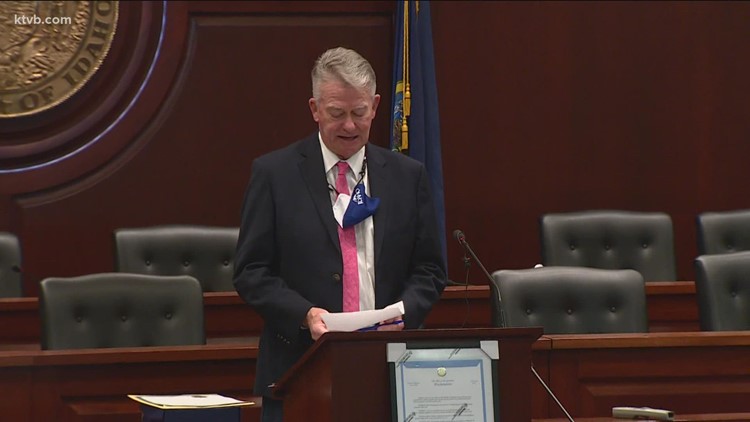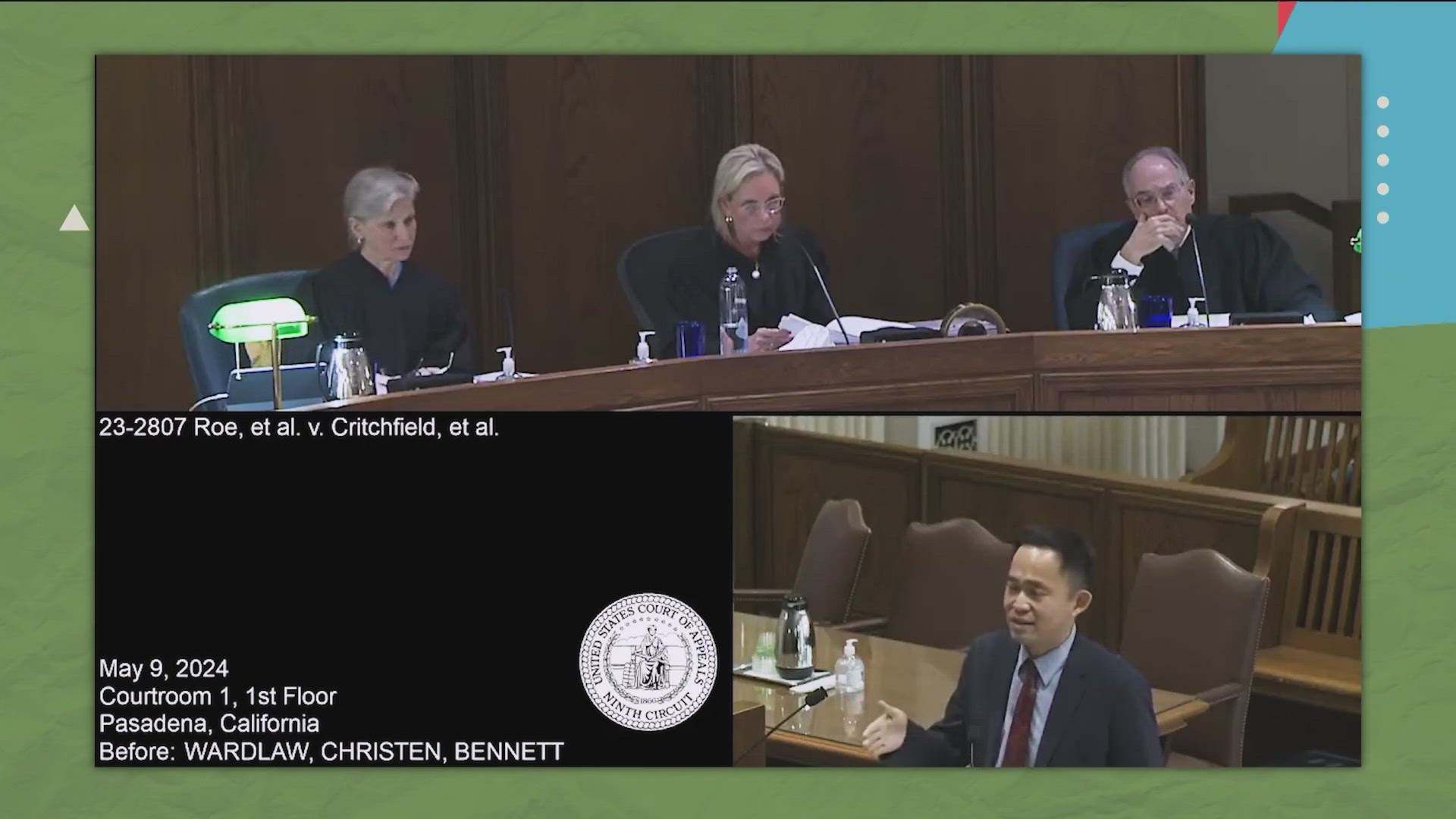BOISE, Idaho — Editor's note: This story originally appeared in the Idaho Press.
It’s long been assumed in Idaho that whenever the governor leaves the state, even for just a short period of time, the lieutenant governor fills in as acting governor.
The Idaho Constitution appears to say so, in Article IV, Section 12, which includes “absence from the state” among a list of reasons for passing the reins of state government to the lieutenant.
But a new Idaho Attorney General’s analysis, written in response to a request from the governor’s office, notes that when other states have tested similar constitutional language in court, the results have been evenly split: Half have found that “absence from the state” means physically leaving the state; but the other half have found those words to signify “effective absence,” meaning an absence that prevents the governor from fulfilling the duties of office.
There’s a big difference, especially in the modern age, with instant communication. In 1889, when the Idaho Constitution was written, physical absence also meant an inability to do the job.
“It wasn’t until 1915 that the first coast-to-coast telephone call was completed,” the Attorney General’s analysis notes in a footnote. The analysis calls the matter a “close question,” but concludes that the “effective absence” interpretation is “reasonable.”
In July, Idaho Gov. Brad Little adopted the “effective absence” interpretation, after Lt. Gov. Janice McGeachin used his brief absence in May to issue a surprise executive order banning all local mask mandates, something Little retroactively reversed when he returned and called “an irresponsible, self-serving political stunt.”
A subsequent Idaho Attorney General’s opinion found McGeachin’s order was both illegal and unconstitutional and attempted to create new law through executive order.
McGeachin, who like Little is a Republican, is among an array of candidates who have announced they’re challenging Little in the 2022 GOP primary. Little hasn’t yet announced his reelection plans.
But with the two at odds, when Little next left the state, in late July, he sent McGeachin a letter saying that while he’d be out of state briefly traveling through Utah to get to eastern Idaho, she was “not authorized to act as governor” while he was gone.
McGeachin bristled, saying on Twitter, “Maybe Brad needs to brush up on the Idaho Constitution.” But Little’s 20-minute absence from the state was over before she’d gotten confirmation it had started.
Then, this past week, Little sent McGeachin a similar letter as he headed to the U.S.-Mexico border for two days to meet with other GOP governors there.
This time, she issued a new executive order forbidding COVID-19 testing or vaccine requirements in Idaho public schools and universities, and also inquired into how she could deploy the Idaho National Guard to the southern border. Little, again, retroactively rescinded her order — but this time, he did so from Texas, hours before he flew back to Idaho on Wednesday evening.
Little also strongly condemned McGeachin’s actions regarding the National Guard, as did former Gov. Butch Otter, who also was Idaho’s longest-serving lieutenant governor.
"This is not the way a governor acts,” Otter said in a statement. “I attended the funerals of many of our warfighters and saw the grief in their families' faces. The lieutenant governor belittles and demeans their sacrifice by playing political games with the men and women of the Idaho National Guard and their families. It is shameful and unacceptable."
McGeachin, speaking on KIDO Radio, said she was merely inquiring about the process of deploying the Guard and that that is something she as lieutenant governor is entitled to know. She also complained that her email to the National Guard’s adjutant general about the matter, which was a formal inquiry from her office, was a “private” letter between the two that she said shouldn’t have been “leaked” to the public, though Idaho law makes all such communications public records.
In an unrelated case, McGeachin recently was fined $750 by an Idaho judge for her “bad faith” violations of the Idaho Public Records Act in refusing to release records regarding an education task force she set up; she later released the records under threat of contempt of court.
McGeachin told the Idaho Press on Friday that she believed she had “constitutional authority” to issue her order on testing and vaccines. She also sent a tweet on Friday, in response to a tweet from Little about border protection, saying, “You know what else is in the Constitution? That the lt. governor has all the powers of the governor whenever he is absent from the state.”
In Little’s executive order rescinding McGeachin’s order, he wrote, “The lieutenant governor’s actions were without legal authority. I did not direct or authorize the lieutenant governor to act in any manner. … Nor does my temporary presence in Texas on official business impair my ability to represent the people of Idaho thus necessitating action by another executive to ensure the continuity of state government. The Founders of our Constitution did not permit, nor would they now sanction, a lieutenant governor’s actions to subvert or supplant the policies of an otherwise capable, qualified, and duly elected governor.”
The Attorney General’s new legal analysis was authored by Chief Deputy Attorney General Brian Kane and stretched for 16 pages.
“It seems likely that a reviewing court would find the phrase ‘absence from the state’ ambiguous,” Kane wrote in the analysis, in which he also reviewed comments at the state’s Constitutional Convention; other provisions of the Constitution and state law; and court cases in numerous other states.
McKay Cunningham, a former law professor at Concordia Law School in Boise who now teaches constitutional law at the College of Idaho, said, “The very first thing a court is going to do, especially when interpreting constitutional language, is to see whether there’s an ambiguity.”
If so, the court could then look to the intent of the framers and other factors. But if not, it’d have to stick to the “plain language” of the words.
From a “pragmatic,” rather than legal, point of view, Cunningham said, “It just makes very little sense that if the governor steps his big toe outside of state lines for a moment, the lieutenant governor takes control.”
That could lead to an “absurd result,” he said, with wild policy swings in short periods of time as one official or the other is in charge.
“In order to avoid an absurd result, the court might stretch to find an ambiguity,” Cunningham said. “That makes sense, that’s something that the court has done historically.”
Kane’s analysis suggested various sources of ambiguity, including the use of the same words slightly differently in a related section of the Constitution regarding when the Senate president pro tem or speaker of the House are in line to fill in as acting governor.
In addition, the Idaho Constitution charges the governor with the state’s “supreme executive power” in communicating with other states or the federal government, which Kane said shows the governor has a role beyond the state’s borders, not just within.
Cunningham noted that at the national level, the 25th Amendment to the U.S. Constitution talks about presidential powers passing to the vice president when the president is “unable to discharge the powers and duties of his office.”
“How strange would it be if Joe Biden or Donald Trump or whomever happened to be on a foreign trip to France, and all of a sudden have the powers stripped from them?” he asked. “It just doesn’t make a lot of sense in present-day time.”
Plus, he said, “The people of Idaho voted for Brad Little as their governor. They didn’t vote for Janice McGeachin as the governor. So there’s a little bit of an aspect here that the will of the people is being undermined if the governor, every time he needs to go to Salt Lake City or Spokane, cedes all of the authority of his administration to a lieutenant governor that doesn’t happen to share the same policy perspectives.”
A court could only address the issue if someone sued. Cunningham said potential avenues for that include a school that’s “caught in the middle” over whether it can conduct COVID-19 testing or not asking a court to decide “the validity of these dueling executive orders,” or perhaps McGeachin going to court to claim her order remains valid, because Little’s was issued when he was physically out of state.
The fact that courts in other states have been evenly divided on the question, Cunningham said, “is interesting and it adds to the lack of clarity.”
Betsy Z. Russell is the Boise bureau chief and state capitol reporter for the Idaho Press and Adams Publishing Group. Follow her on Twitter at @BetsyZRussell.
More from our partners at the Idaho Press: Indoctrination task force member dies of COVID
Watch more Idaho politics:
See all of our latest political coverage in our YouTube playlist:



